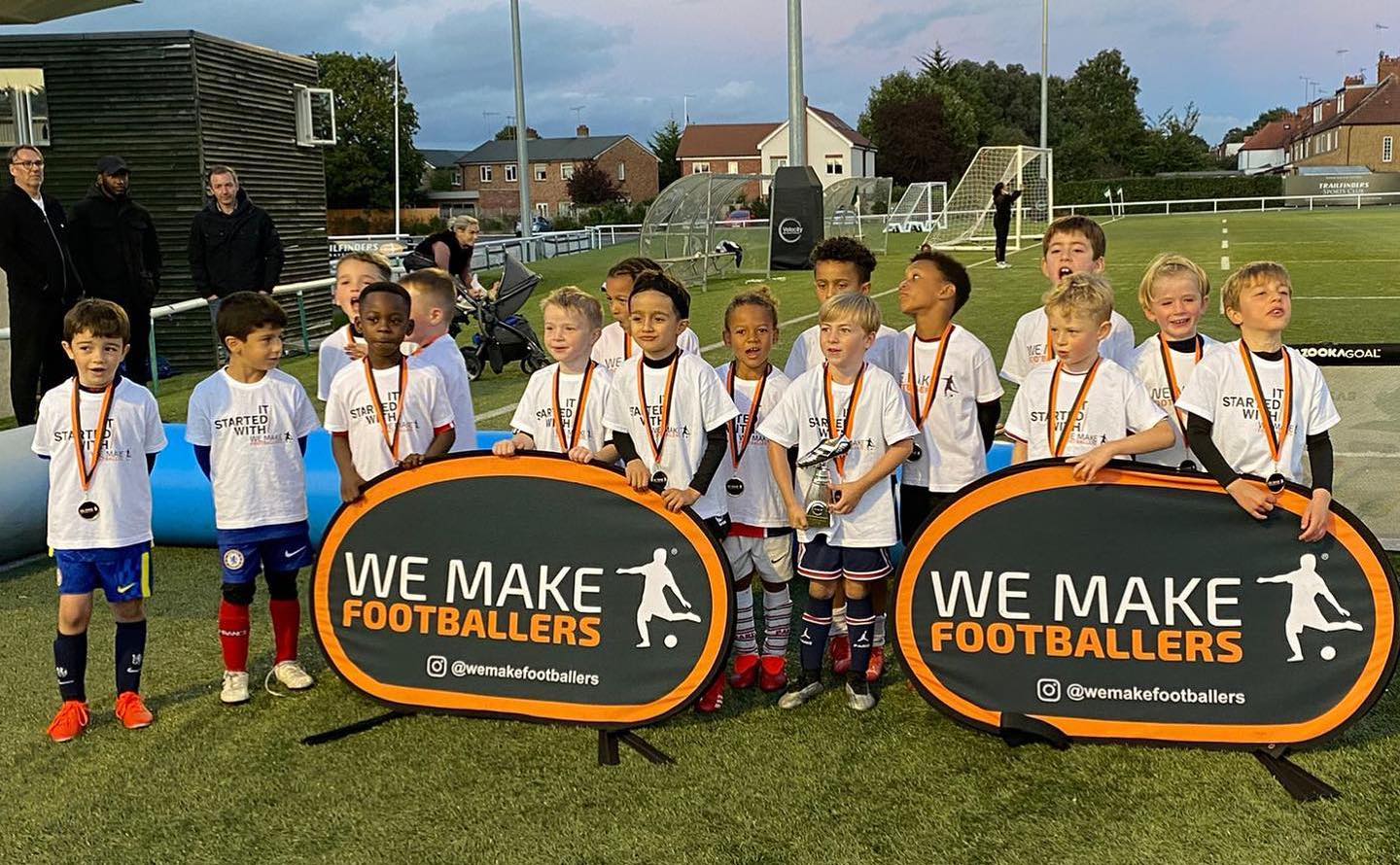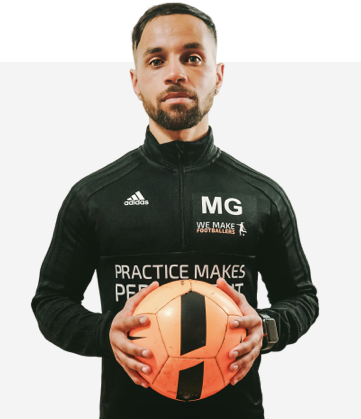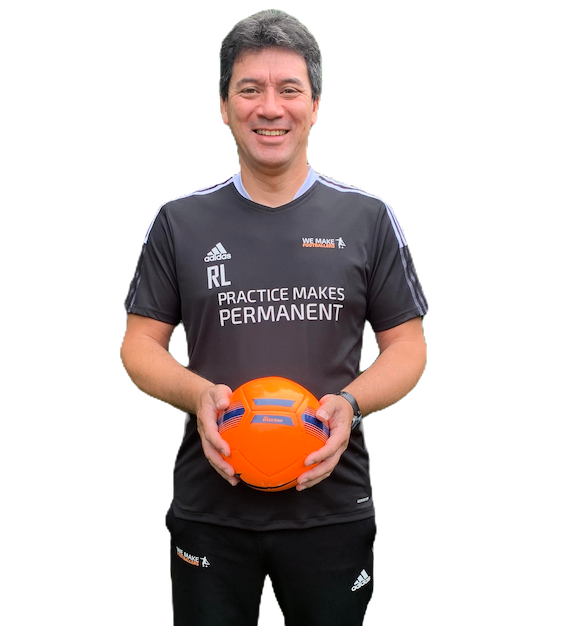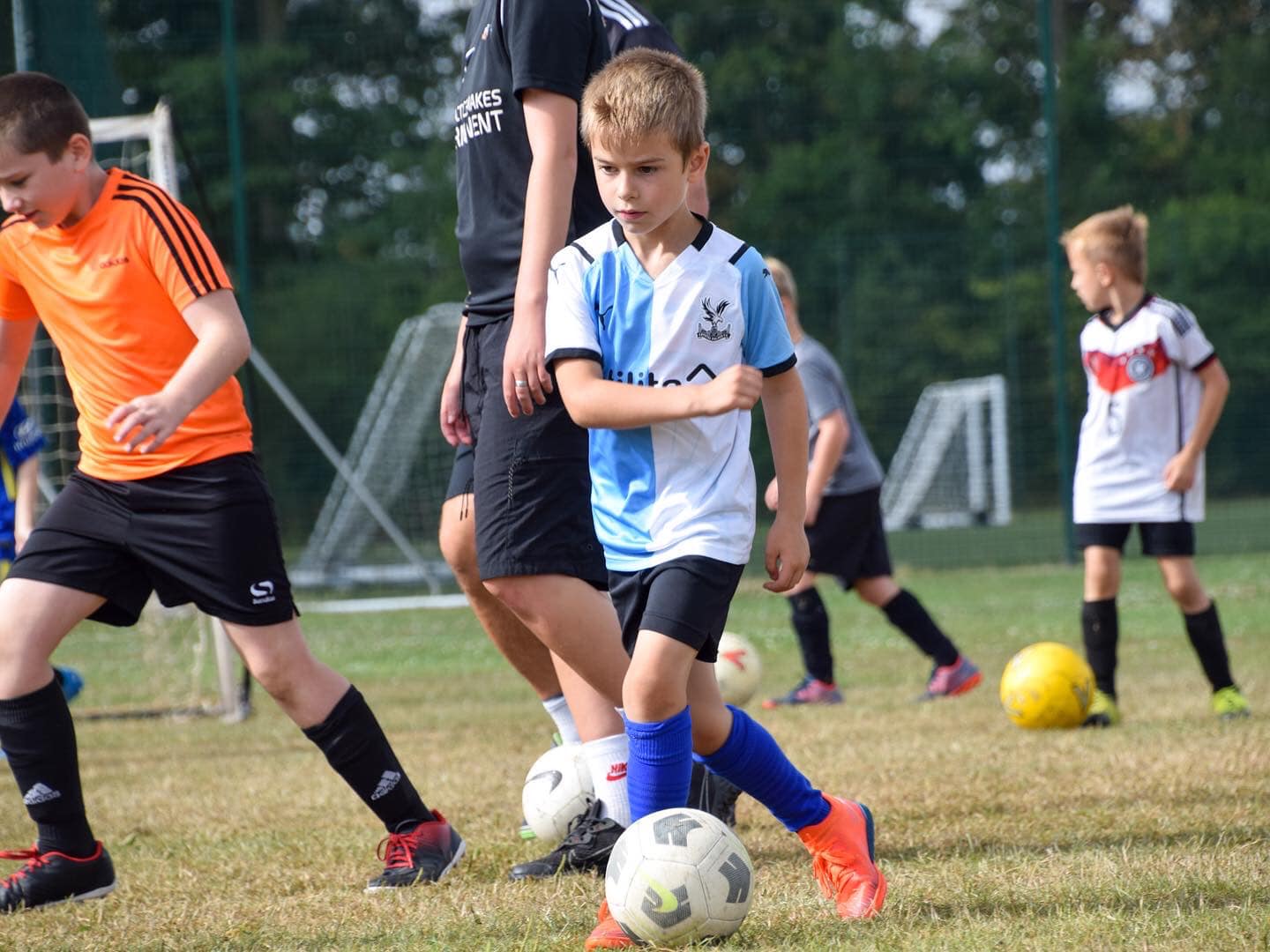As Fabrizio Romano might say as the summer transfer window enters its final week, done deal, and here we go!
We Make Footballers are delighted to announce the signing of YouTube stars, The Grimwade Family, who have started their own football coaching franchise with us in Sutton.
In keeping with the approach that has propelled The Grimwades to almost 300,000 subscribers on YouTube and over 80,000 followers on Instagram, We Make Footballers Sutton is very much a family business.
Dad Tim and mum Ella had help at the start of their franchise journey from their three oldest children, with six of their seven – yes, seven – kids taking part in classes.
Here is The Grimwade Family’s We Make Footballers story so far…
Meet The Grimwade Family
The Grimwades are an interracial home-schooling family of nine from London, consisting of dad Tim, mum Ella, and kids Heze, Hosanna, Halle, Harper, Hazariah-Reu, Houston and Halo. They have an astonishing 10 Instagram accounts between them, each followed by tens of thousands of people.
Their latest Instagram account is WMFSutton, providing an insight into what goes on at their new We Make Footballers academy.
The Grimwades are also on Facebook and in 2020 starred in Channel 5’s eco-show, Go Green with the Grimwades, where the family attempted to become more environmentally friendly. Easier said than done when there are eight of you, the programme being filmed before Halo was born.
It is YouTube though where The Grimwade Family really shines.
They have been vlogging since 2017, sharing everything from daily life in the Grimwade household, to family milestones. Their followers are known as The Grimwade Gang and enjoy watching the family take on challenges, go shopping and even get their haircut.
The Grimwade Family are football obsessed, with eldest son Heze already signed by Chelsea and a Nike athlete. That football obsession has led The Grimwades to discover We Make Footballers and with it their own franchise, which now provides two football coaching sessions per week on a Tuesday and Wednesday, for children aged between 4 and 12 living in Sutton and the surrounding area.
The Grimwades and We Make Footballers
The Grimwades first became associated with We Make Footballers when Hazariah-Reu (known commonly as Reu) attended sessions at our Bromley academy, the area of London where the family previously lived. Reu loved his coaches so much that he referred to them as Aunty Sara and Uncle Amir.
When The Grimwade Family moved from Bromley to Sutton, they had been suitably impressed by We Make Footballers to set up their own academy. This not only allowed Reu to continue his footballing journey, but the whole family and other children in the area to benefit from weekly coaching sessions in a fun and safe environment.
Setting up a We Make Footballers Franchise
We Make Footballers are the biggest football coaching academy for children aged 4-12 in the United Kingdom for a reason. Every franchisee receives full training and support in setting up and then growing their business, from a dedicated support manager to qualification and learning programmes, to help establishing partnerships with local grassroots and professional clubs.
For their training prior to opening We Make Footballers Sutton, The Grimwades took Heze, Hosana and Halle along with them to see exactly what goes into opening a new business.
This fits in perfectly with Ella and Tim’s approach to home-schooling, where they want their children to learn through experiencing real life situations. “We do try and use general life for learning, because what better to learn about?” explains Tim. “Sometimes it is book work, other times it is experiences the kids will go through in their lives. Going to an event, trying to get a mortgage, organising the bills, trying to budget, taxes, this is what we try to involve our children in.”
“The way I have always learned best is by going through the real life situation,” adds Ella. “I am sure many of you can relate to that. If my dad sat me down and said, ‘Right, you do this when you go to the shop’, I would really be kerfuffled in my mind about it.”
“But take me to the shop and we do it all there. I am going to remember it better because we have gone through it step by step and it just makes sense at that moment. Because sometimes when you imagine things in your head, you forget the specifics of the situation.”
This practical approach is mirrored in the way We Make Footballers coach their players, with an emphasis on as much playing and contact time with the ball. The overriding philosophy of We Make Footballers is “Practice makes Permanent.”
And this is what makes The Grimwade Family ideal franchise owners.
But before we get to that, how did they find the training given to new franchise owners ahead of setting up We Make Footballers Sutton? Second-eldest Hosana certainly enjoyed it, passing the end-of-learning tests with flying colours – even outscoring dad Tim!
“It was really fun, it was like being in a boardroom,” said Hosana. “It was cool to be in a boardroom with adults and stuff, it felt grown up. I liked taking in the knowledge. We had little pads and we were writing stuff down for the tests. I was always beating daddy in the tests.”
Practice makes Permanent at We Make Footballers
Everything that happens at We Make Footballers is guided by the idea that practice makes permanent. It is emblazoned across the front of our coaches’ training shirts, and essentially means that the more a football player practises a skill in the right way, the better they become.
It’s all about hard-wiring the brain and muscles to perform certain actions in specific situations as second nature.
We Make Footballers instil good habits into children from a young age, so that small differences make gains, like a player looking up before shooting without even needing to think about it. This is achieved through repetitions, removing fear of failure and creating a fun environment.
The We Make Footballers ethos is a major reason why Tim wanted to get involved as a franchise owner. “What I personally love about the We Make Footballers brand is they are so big on contact time with a football. It’s not lining up, taking one shot, going to the back. It’s one-v-ones, dribble, shoot, defend, all encompassing.”
“If you win, you lose, that is not important. What is important is that you try again, and again, and again. Sometimes you will get great results, sometimes it might not go so well. That’s no problem, it’s all part of the journey.”
“I could not have got behind any kind of brand which didn’t represent my ethos and how I develop my children. We Make Footballers is so in line with how I have spent years of time with the boys and the girls.”
We Make Footballers is About More Than Just Football Coaching
We Make Footballers prides itself on providing football for children of all abilities. One of the most rewarding aspects of becoming a franchise owner is seeing those they are coaching grow as people thanks to the social skills and friendships that develop through football.
Ella tells of one of her favourite success stories from The Grimwades running We Make Footballers Sutton so far: “We had one young boy come for his first week. It was his first extra curricular activity. He was super-duper shy. He then came back the second week and he was fully involved. I was almost surprised, like ‘Oh hi mum, great, good to see you again’. You’re helping children develop not only in football but as individuals.”
There are also the benefits which come from the routine and physical activity football provides. Weekly football coaching sessions at We Make Footballers give children something to look forward to, an opportunity to let off steam and experience the scientifically proven mental boost which comes through exercise.
Ella recalls the experience The Grimwades had when Reu was part of the We Make Footballers Bromley academy: “There was one week I remember where we so busy that we couldn’t take Reu to his sessions, it might have been when I was first pregnant with Halo or something, there was a lot going on. And I could see how his week went downwards just because he didn’t get out and he didn’t have that activity to go to.”
“Having something in place that you know is going to be regular, you know is going to be great fun, that your kids can go to and have a great time, you can socialise as well, it’s just all round great.”
Football Coaching for Children of All Abilities
It is this emphasis on looking beyond just football which is why We Make Footballers academies welcome children of all abilities and experience. Whether a child has never kicked a ball before beyond the confines of their own garden, or they are already the star player in the local Under 9s team – We Make Footballers are there to help them improve.
The Gimwade Family are a great example. Before We Make Footballers Sutton, Hosana had never played football in a structured environment. She is loving her weekly sessions, although Ella and Tim seemingly have some way to go in convincing her to become a professional footballer rather than an actress!
“It’s always fun and as much as there is competition,” says Hosana, “you are helping each other and you get to meet new people. In some of the warm ups, you have to learn a skill and then in the games, you have to try and challenge yourself to do that skill, which I want to try and get better at doing.”
“I have been enjoying it so much. I still want to be an actress, but for exercise and running around, it’s really fun to play around with a football and express yourself.”
For 7-year-old Harper, We Make Footballers fills a different purpose in helping her gain the attention of professional clubs. Her age means she can train with both the 4-7 and 7-12 age groups at We Make Footballers Sutton and in just a few months, she already has interest from Chelsea and Arsenal.
We Make Footballers Can Open the Door to Professional Academies
If Harper does sign with either the Gunners or the Blues, she will be the next in a long line of young football players who We Make Footballers have helped join a professional academy.
All We Make Footballers franchises have links with local clubs, whilst many of our coaches are also employed in the professional game, working as scouts or within academy setups.
We Make Footballers also run regular Talent ID events, inviting scouts along to watch local children during a training session. This foot in the door we have to the professional game is priceless in helping children who want to try and take the next step.
And it is something which Tim is particularly excited about when it comes to We Make Footballers Sutton: “We Make Footballers is very well connected. We had a Talent ID event where we had 60, 70, 80 kids on our waiting list. The event was full up with 80 kids and we had a whole other session pretty much good to go.”
“We brought scouts down to watch the children play and if the scouts liked what they saw, we would put them in contact with the parents. And that does not stop there because our family is obviously in touch with Chelsea [through Heze being in the academy]. If someone came and was amazing and I said to Chelsea, there’s this guy, would you mind having a look, they will.”
The Benefits of Franchising with We Make Footballers
Franchising with We Make Footballers offers the opportunity to turn a passion for football into a career. Franchise owners in turn, provide a community service by bringing the beautiful game to children in areas where the chance to play may not currently exist.
To help children develop as players and people ranks among the most satisfying aspects of becoming a football coach. But equally enjoyable for a franchisee as knowing they are making a difference while watching their business grow and expand – something We Make Footballers help all franchise owners with, once their first academy is up and running successfully.
“I found it was so fun, going into business and meeting new people,” says Ella. “From an owners’ point of view, it is great to see it grow and have people come back.” Tim adds: “It’s amazing. To start something, it’s like our YouTube channel.”
“You start it, all of a sudden you have more followers, you have more people who want to know about your life and enjoy your content, and who are encouraged by your content.”
“We want the class to be full, we want the class to be fun, that is how the kids will get the most out of it and it is how we will get the most out of it. Because that is another thing. Having Harper, Hez and Reu and helping them develop as footballers, now we are helping a wider range of kids and that is really cool.”
The Grimwade Family run their We Make Footballers Sutton coaching sessions on Tuesday evenings at Sutton High School and Wednesday evenings at Harris Academy. The first session is free. To discover more or sign your child up, please see the We Make Footballers Sutton academy website.
We Make Footballers offer franchising opportunities all over the country. If you would like to follow in The Grimwade Family’s footsteps and launch your own academy business, please see the We Make Footballers Franchise website for more information.









